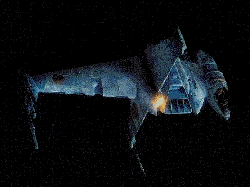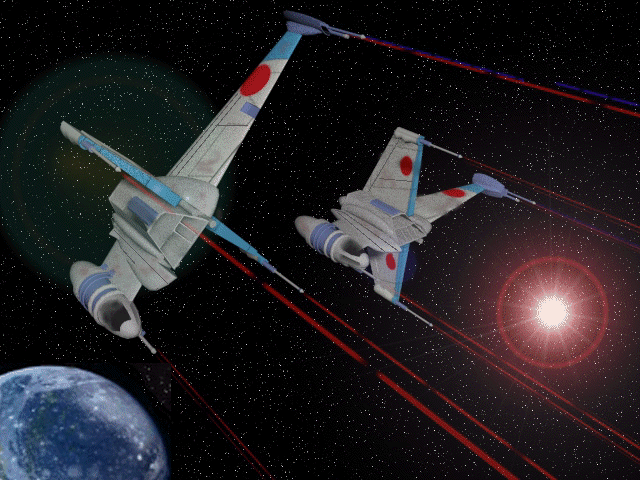The B-wing Starfighter


NAME/MODEL: B-wing Starfighter
DESIGNER/MAUFACTURER: Slayn & Korpil
COMBAT DESIGNATION: Heavy Assault Starfighter
CREW: One pilot
LENGTH: 16.9 meters
CARGO CAPACITY: 45 kilograms
ENGINES (4): Four Slayn 8. Karpil JZ-5 fusial
thrust engines Rated at 290 KTU
SENSOR SYSTEMS: FabritechANv-9a with Phased Tachyan
Array PH-5s Primary Thread Grid PK-8f
TARGETING SYSTEMS: Fabritech ANq 3.6 tracking computer
and IN-344-B "Sightline" imaging system
S-FOIL WINGS: Three S-Foil Wings
ION CANNONS: Three Armek SW-7a ion cannons
(single fire or fire-linked)
PROTON TORPEDO LAUNCHERS: Two Krupx MG9 proton torpedo launchers
6 torpedoes each
LASER CANNONS: Three Gyril R-9x laser cannons
(single fire or fire-linked)
DEFENSES: Forward / rear projecting Chempat
shields (rated at 50 SBD)
SPECIAL DESIGN FEATURES: Gyroscopically-stabilized Command Pod
The B-wing Starfighter is a ship with tremendous combat capabilities. Admiral Ackbar, then a
Commander, designed the B-wing (with the aid of Slayn & Korpil, a Verpine engineering
company) as a response to the increasing number of Nebulon-B Frigates present at Imperial
military targets.
There are some who say that the B-wing is too powerful to be a starfighter; indeed, it packs
more power than an average Correlian Corvette. One laser cannon and two Auto-Blasters enable
the B-wing to blast through capital ships' shields while retaining the tracking and recharging
capabilities needed for starfighter-to-starfighter combat. The presence of ion cannons (three
of them) makes the B-wing versatile enough to take place in capture operations. They also
make it even more threatening to medium-sized capital ships such as the Nebulon-B Frigate,
which, once their shields are down, are particularly vulnerable to the system-disrupting damage
done by ion cannons. Two proton torpedo launchers complete the B-wing's arsenal.
The B-wing was an instant success. After several engagements in which the B-wing
distinguished itself, the Imperial forces were at a loss as to how to protect their convoys. There
is a rumour (unconfirmed) that during a raid on one such convoy, an Imperial-Class Star
Destroyer arrived on the scene too far away to engage the B-wings and launched TIE Fighters.
The TIEs, upon seeing the B-wings heading straight towards them, turned tail and fled back to
the Star Destroyer. This story is unlikely, since the TIE pilots knew what kind of punishment
would be meted out to them upon their return, but serves to illustrate the reputation of the
B-wing.
Several drawbacks do exist. The B-wing is slow (its speed is comparable to a Y-wing) and
very tricky to maneuver. It utilizes a unique manuevering/stabilizing system. During combat,
the cockpit and command pod stay stable while the rest of the ship rotates around it. This
provides the pilot protection against G-forces but requires much training to master. In addition,
the system places stress on the B-wing's servomotors, which often freeze and require much
maintenance. However, the B-wing's shields and hull are powerful enough to withstand several
hits, and overall, pilots who learn to master the B-wing usually prefer it above all other craft.
B-wings were present at the Battle of Endor, where they assisted the Rebel Cruisers in
confronting Star Destroyers. They also provided the much-needed ability to strike
well-defended Imperial convoys and shipyards. There is another type of B-wing, called the
B-wing/Expanded (or B-wing/E) which has a longer, two-man cockpit, allowing the addition of
a
gunner. The picture included (above) is of a B-wing/E.



